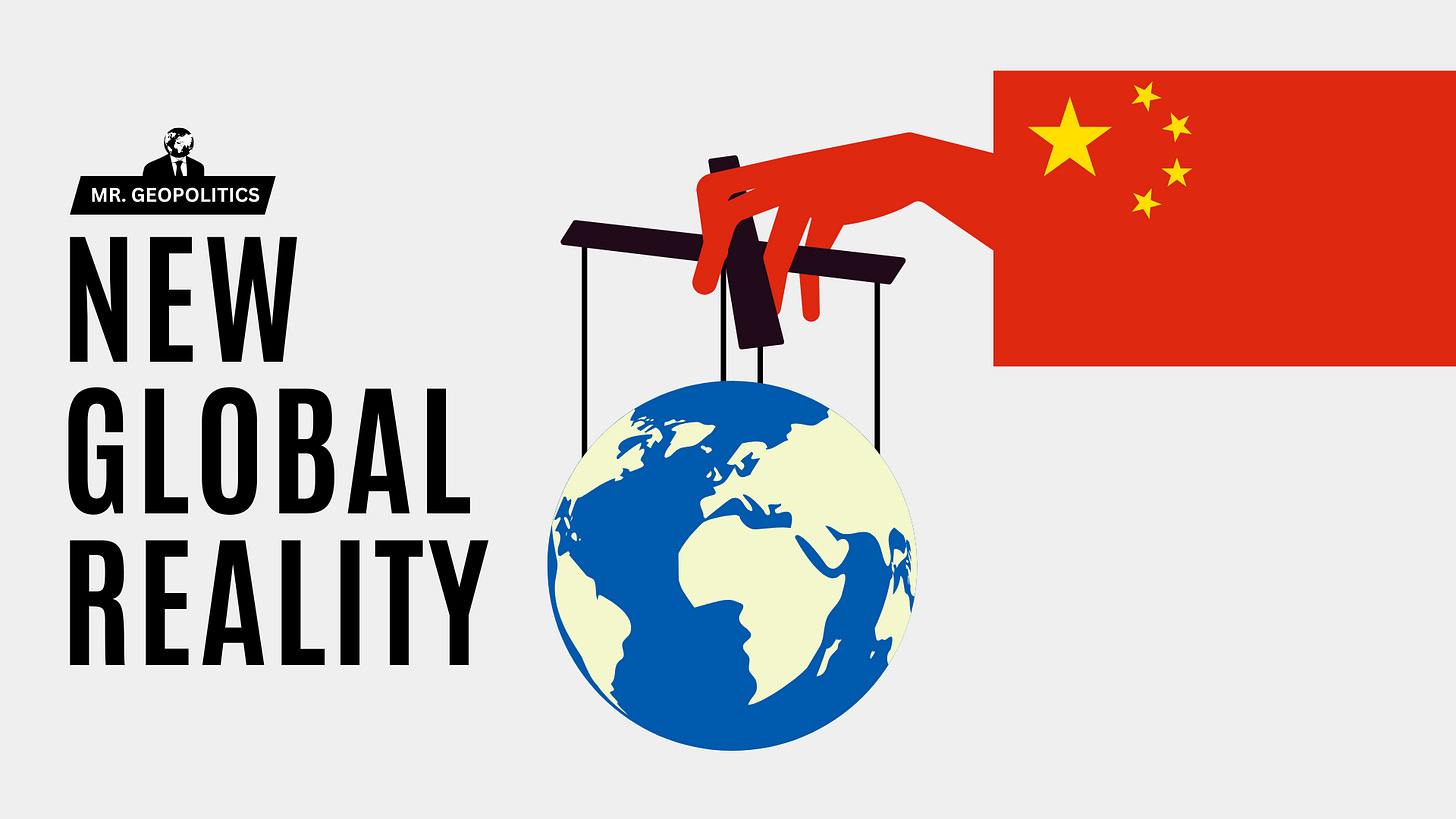China Just Turned Global Trade Upside Down
New rare earth ruling is a geopolitical nuke
By December, China could be calling the shots for the most strategic parts of the global economy—placing America in its weakest position in decades.
From December 1, any business using over 0.1 % of certain Chinese rare earths or related technologies in their products must gain an export license from Beijing. This applies to companies building products in other countries but still using specific Chinese critical minerals. Technical language aside, companies that rely on Chinese critical resources now need Beijing’s permission to sell globally.
Read the tea leaves, and a shocking reality is forming: US-China geoeconomics have entered a new gear, where America and its allies are on the defensive. China is moving into a new role, effectively deciding what can be traded in global markets.
Considering last year, over 90% of the world’s rare earths were processed in China, it is not too far to imagine China expanding its export license to all rare earths. The Chinese government could then refuse to grant export licenses to “unfriendly states", disrupting the trade of everything, from satellites to jet engines, smartphones to wearables, EVs to wind turbines.
CHINA’S GLOBAL ECONOMY
This is no “small action.” China has opened the door to a new reality for the US and the world: global trade flows could soon depend on China’s blessing. This is not hype or over-sensationalism. This goes beyond supply chain weaponization. This is a new kind of “reliance weaponization*” (i.e., reliance on China being leveraged against the country’s chief adversaries). And, China is making this move just weeks before an anticipated meeting between Donald Trump and Xi Jinping. If the two leaders meet, they will be doing so in a new climate.
The shockwaves of what China has done are huge:
Access to electronics, appliances, defense equipment, automotive, machinery, and technology could increasingly depend on being in China’s good graces. The situation is so profound that American businesses might not be able to sell to the world without China’s permission. This is akin to a “semi-blockade” of the American economy, as Beijing decides what can enter or leave. Another way to look at it: a “hostile takeover” in geopolitics.
The sovereignty drives of many economies, to bring supply chains or production back home, have just been turned upside down. Even if a car is made in Germany, reliance on Chinese supply chains could give Beijing the final say. Governments that sought to keep foreign states out of the economy are staring at exactly the opposite.
Global companies face a nightmarish situation where they are being squeezed on rare earth supplies, and are also being “punished” by using the Chinese minerals. No business wants to be “controlled” by a country. Yet this is exactly what is on the line.
(*”Reliance Weaponization” is a concept/expression of Abishur Prakash)
GEOPOLITICAL BLOWBACK
The big question is whether China has gone too far in its rare earth move.
Unlike during the pandemic, when few businesses were convinced that economic reliance on China had to end, the expanded rare earth controls may push many corporations to redesign “China” in their operations—with the help of dozens of governments uneasy about the latest policies from Beijing.
China might have just started an accelerated decoupling with its new rare earth policies. The idea of using Chinese rare earths, but then needing China’s consent to do business anywhere in the world, will be hard to stomach, particularly in the West. A German automotive firm that makes a part in Germany but uses more than 0.1% of Chinese rare earths may technically need an export license from China, even though the product is made and exported from the German market. This is an expansion of “China’s jurisdiction” that will force many economies to rapidly do a 180.
It is not just companies permanently turning away from Chinese supply chains over a given time period.
The EU is seeking a coordinated response with the G7 to China’s new rare earth play. Just a few months ago, the “China question” was splitting the West. But now, it could bring Western capitals together as alarm bells around economic security and overall competitiveness ring loud.
MARKET MELTDOWN
By expanding the rare earth curbs—alongside restricting global supplies and adding import quotas for the first time—China is threatening to throw stock markets into a frenzy.
Investors are already preparing for a protracted US-China showdown. But in this looming fight, the rare earth move could have a cascading effect. The moment the US and China start swinging again, and Beijing denies export licenses to a dozen Western companies, a meltdown could start.
Rare earth stocks would rise on the back of corporate equities falling, an inversion, as companies are unable to fulfill orders or meet projections. As businesses change targets, share prices will drop, forcing management to make “changes”—like layoffs or new investment pledges—to regain market confidence. Shipping and logistics firms, which are being buoyed by the Gaza ceasefire and hopes that Red Sea fighting is over, could face new pressure if China does not allow specific goods to move—from China or another market.
Debt issuance also becomes an issue, forcing corporate yields to rise as investors become skeptical of how companies plan to grow when China is calling the shots. So far, markets have ignored geopolitics, what I term Ghost Markets. Now, geopolitics is making itself unignorable.
At a moment when the US and the world seek to maintain economic stability, China’s disruptive play with critical minerals will force investors to recalculate everything.
AMERICAN PANIC
The US has been cornered—and most have not even realized it.
America will not be able to stomach the idea that China decides how US and Western companies can operate globally, in turn, giving Beijing unfathomable control over global trade. While US President Trump says that all will work out with China, the reality tells a different story. Short of China walking back its rare earth curbs, the US now operates under a new Chinese economic shadow. At any moment, China could deny export licenses, paralyze American companies, and cause economic and market chaos.
This is what is now hanging above America’s head. And with this, the US must pick its next moves.
However, a separate point underpins all of this. Who cares if China hands out or holds back export licenses? This is the big question in front of the US, the West, the world, and the entire business community.
Complying means ceding control of global trade to Beijing. Rejecting means losing access to the Chinese market and its supply chains
The biggest shift everybody is missing: China has quietly made its biggest gamble for power in the 21st century. It sensed an opportunity, and it struck—hard. Now, the global reliance on China—stretching from the West to the Global South— means little bargaining power. For now, it is China’s game, and everybody else, including the US, is being taken along for the ride.
-ABISHUR PRAKASH AKA. MR. GEOPOLITICS
Mr. Geopolitics is the property of Abishur Prakash/The Geopolitical Business, Inc., and is protected under Canadian Copyright Law. This includes, but is not limited to: ideas, perspectives, expressions, concepts, etc. Any use of the insights, including sharing or interpretation, partly or wholly, requires explicit written permission.







